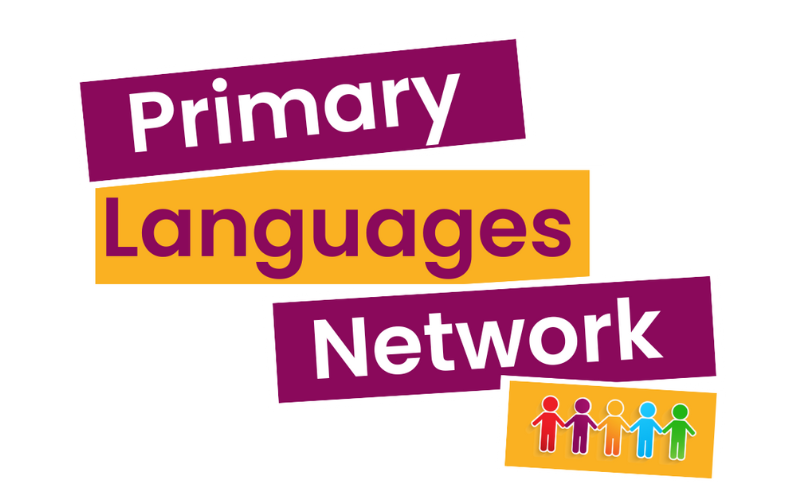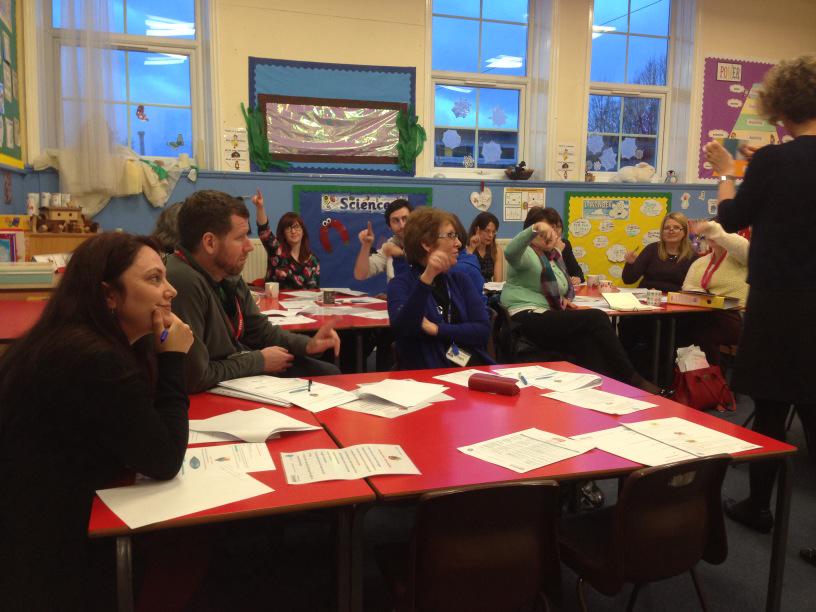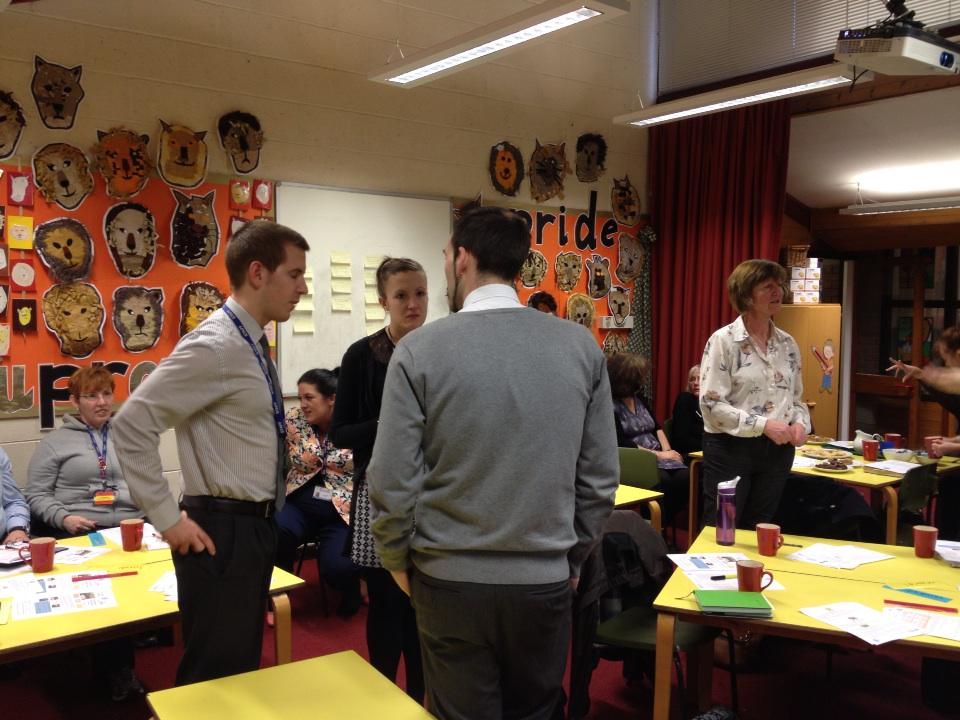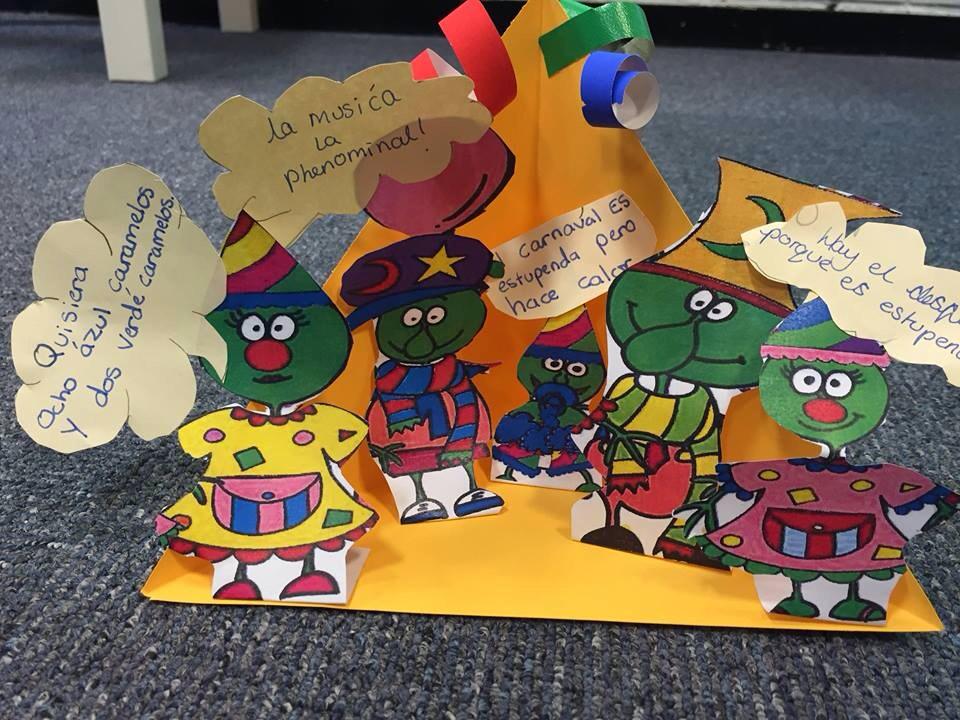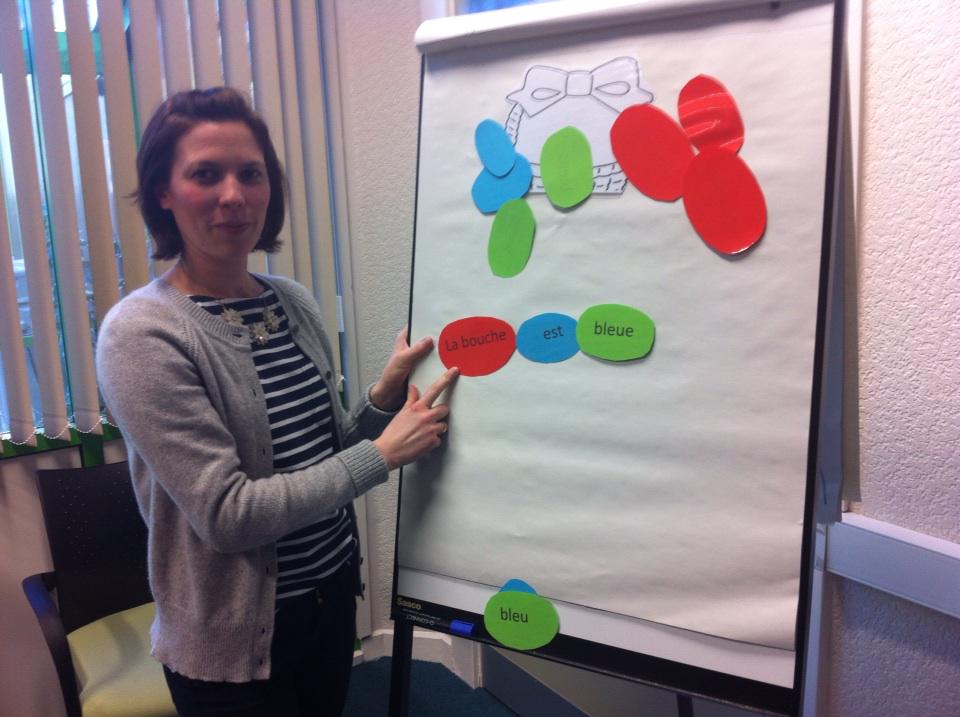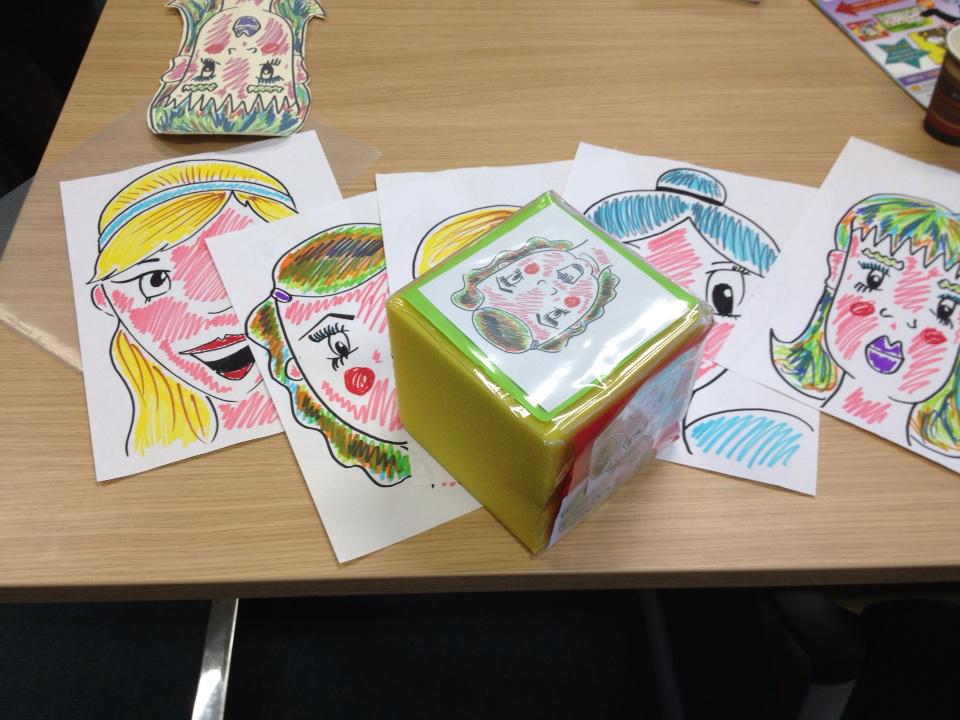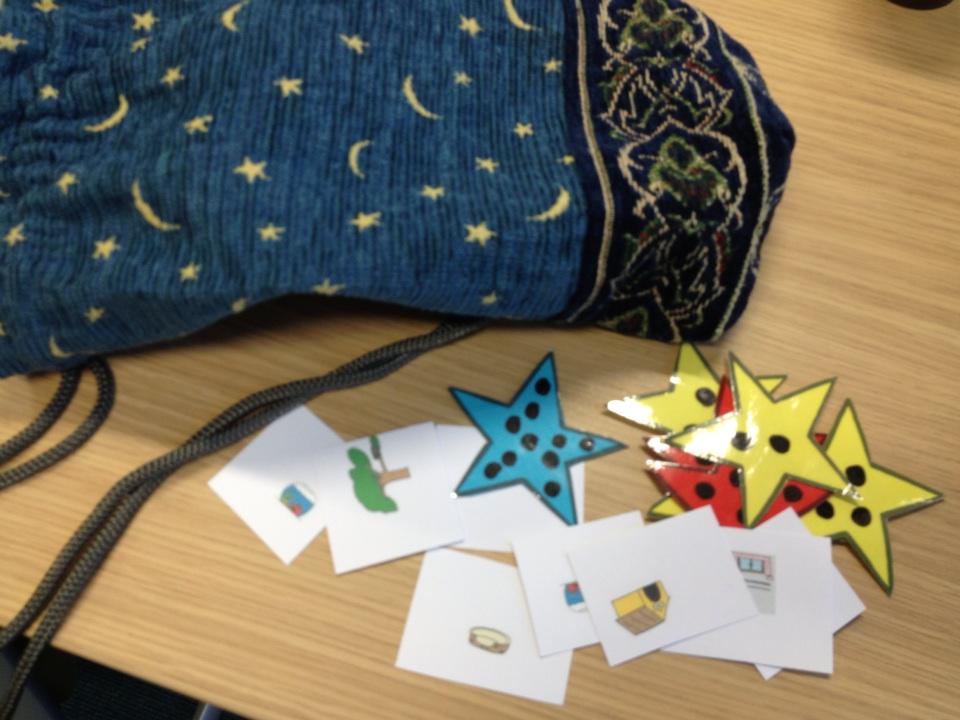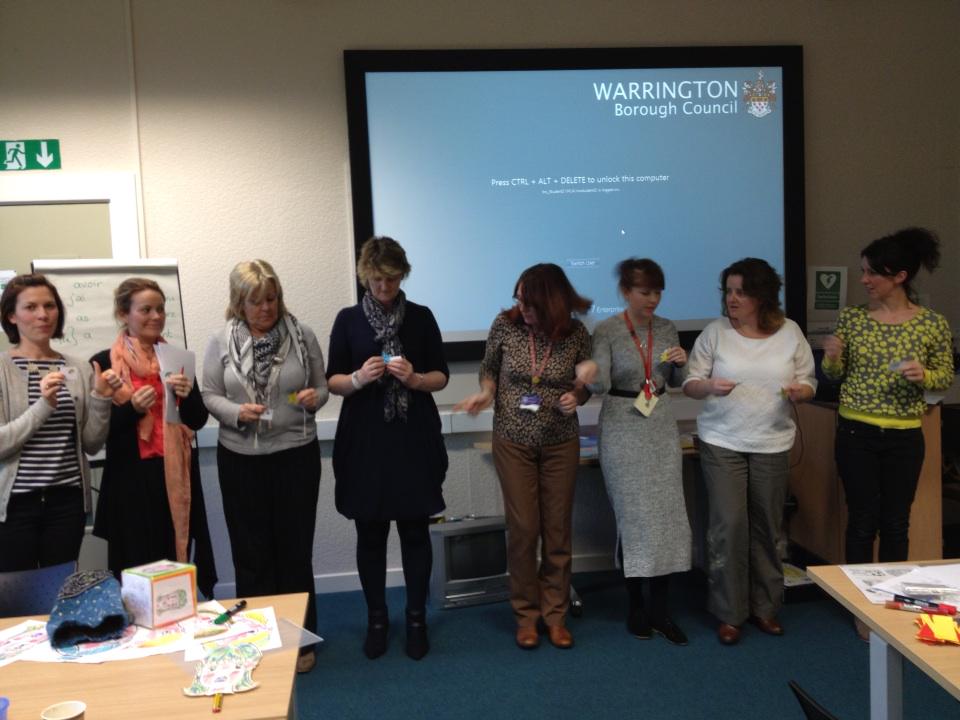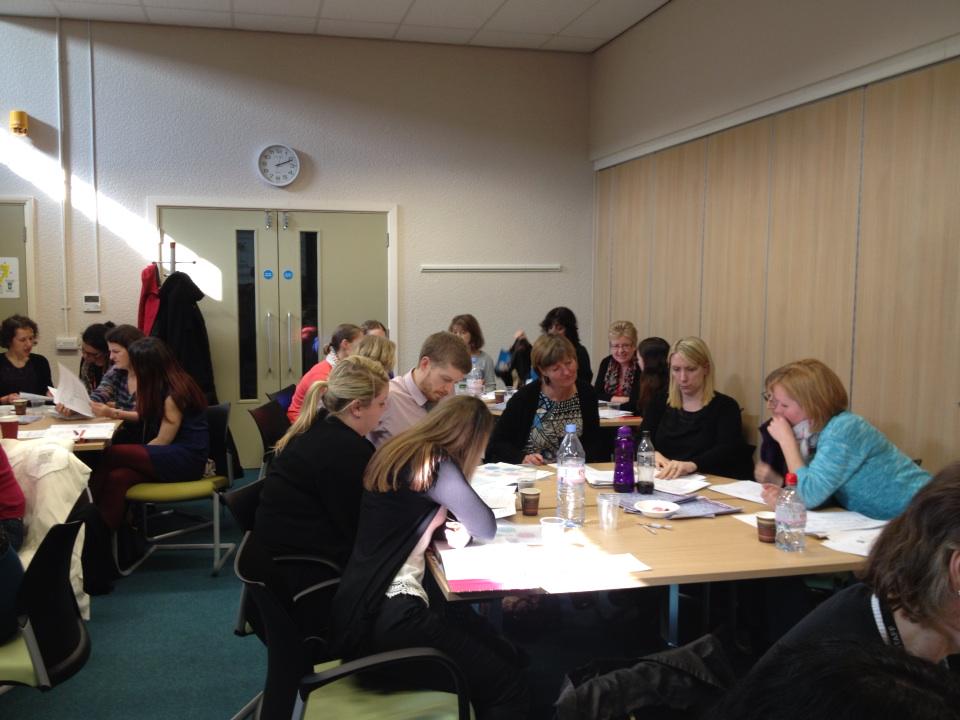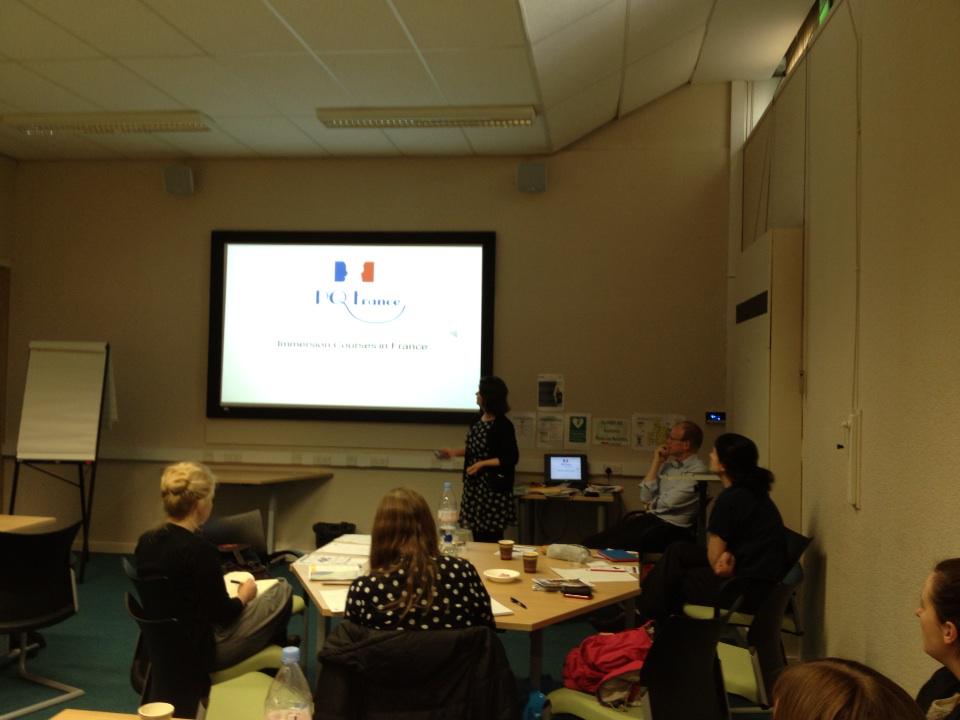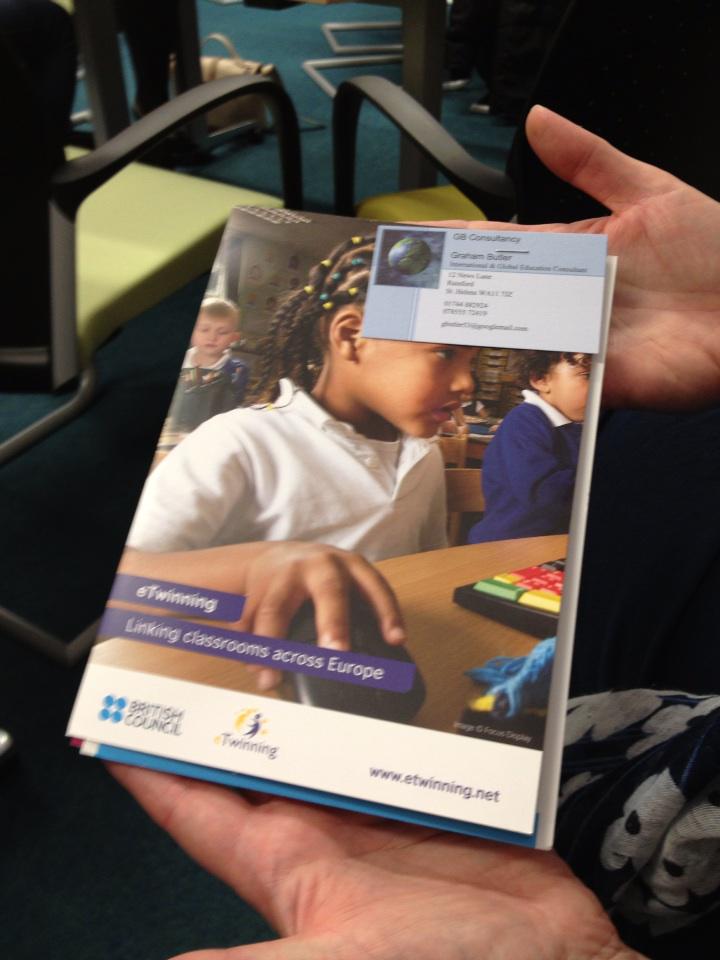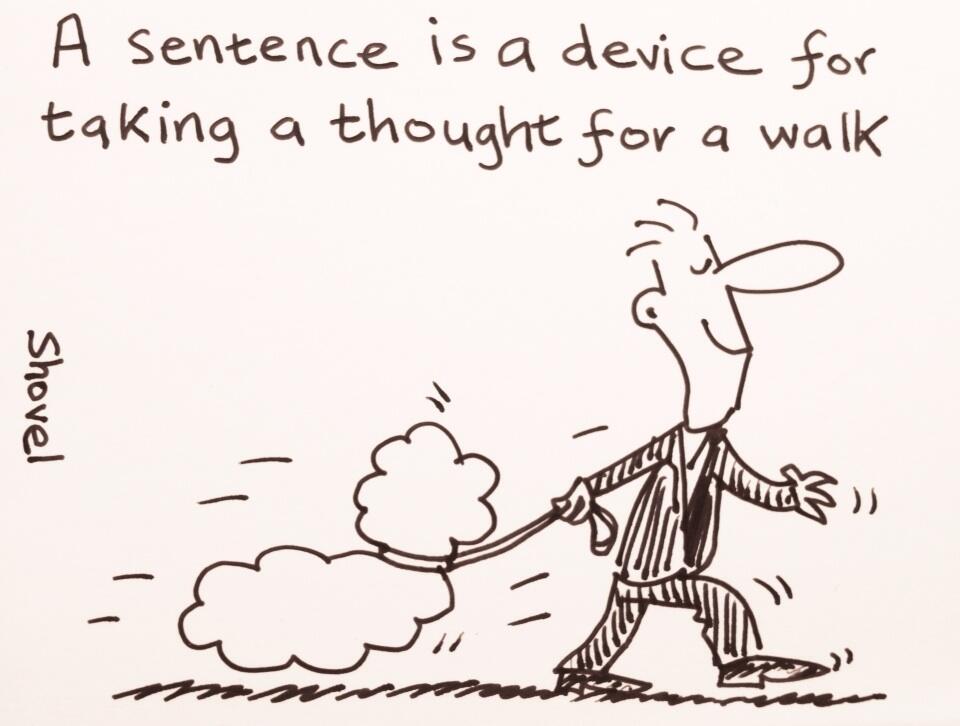[<a href="//storify.com/JanetLloydnet/keeping-the-primary-in-language-learning" target="_blank">View the story "Keeping the Primary in language learning " on Storify</a>]
Team work to develop deeper learning in primary languages.
Each half term we hold a CPD twilight and get together to discuss where we are all up to with our primary language teaching and learning.
What is now very apparent is the insight and knowledge of effective practice and dare I say it "deeper learning" that the team is gaining.
Yesterday evening at our associate CPD twilight this was very evident.In the room we had amongst us the following experience: five ex- secondary teachers, one HOD,two A'Level teachers,one languages consultant ,one leading teacher,4 primary QTS language specialists, 4 native speakers of French and Spanish,one HLTA ....
Normally we meet and discuss what comes next and what we will be using.As per usual we did look at lessons, resources and new ideas yesterday,but we are now quite clearly sharing as a team activities and strategies to encourage "deeper learning".
During the CPD session we began to informally discuss:
- The need to make the teaching and learning of sound -spelling explicit,be it a 5 minute focus or a whole lesson learning objective.the necessity is that the children take over the investigation and learning.the need to plan for this and keep on revisiting and building on this
- The need to help children to have ownership of language learning tools to the learner(such as bilingual dictionaries)
- The need to look at written text and allow the children time to explore, so that they grow in language learning confidence
- The need to unpack language learning stage by stage so it isn't just a string of sounds, a song , a game and then that's the end of the lesson!
- The need to make progress and to encourage children to see how they can move from word, to sentence, to complex sentences to text level
- The need to track the progress the children make and the need to communicate this to the children and the class teachers
- The need to unpack grammar in a primary friendly way and to create puzzles and problem solving activities to enable the children to understand and manipulate the language and its structure.
- The need as the children grow older to make them more aware of important technical language so that they aren't frightened by this.
- The need to make links between languages to prepare children for the changes at secondary level and maybe the change in language.
- The need to allow the children to be creative in their learning and to celebrate this creativity from the manipulation of text, to original thinking or sharing ideas about language function/meaning or a performance with singing and dancing!
Language Learning for Everyone .Second term's report
Firstly a huge thank you to absolutely everyone who has taken part or trained or supported us on this CPD journey so far!
We are delighted to say that we have secured the DFE funding for next academic year too and that these LNM CPD twilights will continue once per term in at the moment 8 different local venues throughout the next academic year.This is just one part of the CPD that we are offering as part of the DFE WTSA/JLN project.
It's time to review last term's CPD and reflect on our success, next steps and what we can do to improve the CPD.We have now reached over 500 local North West teachers and have run local network meetings each academic term this year as well as upskilling in French and Spanish and pedagogy and cross phase CPD.Each meeting is different and the size of the audience varies, but the enthusiasm,determination and commitment is obvious!
Local Network Meeting Review
We have realised that it suits teachers and schools to have the LNM CPD if possible in the first half term of an academic term.The coordinators that attend these meetings can then go back to school and plan to share and use the resources and activities effectively in the second half term.
As always the opportunity to network and share is popular.
Below are two examples of how activities we share at the CPD has an impact on the local delivery of languages in primary.The activities we share are intended to help all colleagues focus upon the ways that they can adapt and use the ideas to deliver effective language learning back in school in line with the Learning Objectives from the DFE POS.
Our carnival stretchy balloon to focus on sound spelling links proved very popular .I loved the fact that teachers at later CPD events brought their class stretchy balloons to show and share - where they had taken the original content , changed the content and created their own learning resource.Brilliant! Exactly what we hope will happen!
To bring primary and secondary together we are offering CPD that we feel ,has value to both primary and secondary colleagues.In Autumn term we invited Joe Dale to share his vast knowledge of APPs and technology and how we could use this as ,a shared language learning tool between stages and ages of learners.
- We need to keep sharing, and the network meetings will allow us to do this.
- We need to keep on supporting colleagues to feel more confident in their ability to deliver or reinforce a specialist teachers delivery of the target language - so we look forward to offering language upskilling next academic year.
- We need to keep moving forward,so the CPD in "Ensuring primary progress" and a possible follow up session for those that attended the CPD this March are both really necessary.
- We all need to keep learning and to keep on exploring language learning.New teacher led CPD trainers need to continue to be nurtured so that fresh approaches are shared and also the impact of projects like this are long lasting and ensure that language learning from age seven is sustainable!
- We need to keep primary language learning "primary" .Creative activities and outcomes appropriate to the age and stage of learner will remain a key focus of this project.
- We need to share our CPD and learn from others too,so links via social media- Twitter,Facebook, blog posts and You Tube are vital.
- We need to continue to strengthen our cross phase work.Languages need to be seen as a learning continuum from KS2 Y3 to KS3 Y9 and beyond.Content,context and skill development needs to be age and stage appropriate.To this end we need to be continue to offer discussion seminars and workshops to strengthen dialogue and "listening"/ "sharing" between KS2 and KS3 colleagues.
Beginning with languages blog 6
Across our network we work with schools who are all at different stages of setting up and delivering primary language learning and each year we welcome new schools who want to set off on their own individual school's language learning journey.

This year these specific
"Beginning with languages "
blogs will try to offer "bite size chunks" of indirect help and support to schools, who are doing exactly that .... just setting off and implementing a language learning curriculum
.
Take a look back at"beginning with languages" blogs
,
,
,
and
Your checklists so far have been:
Sept - Oct ,(first half term) Checklist
- It's all about establishing a whole school support system for all your staff
- It's about small steps and simple language learning
- It's about children and staff beginning to enjoy language learning
Mid October (end of the first half term), an additional new checklist bullet point!
- So how are you all getting on? How do you know that primary languages are being implemented in all the classes and are the teachers and children having fun in their learning?
November (moving in to the second half term of language learning),we added a couple of new challenges to your checklist!
- How successfully have you been able to build in "revisiting" opportunities to build the children and staff's confidence with the language you introduced last half term?
- Are you introducing,revisiting and re-using familiar games with familiar and unfamiliar language for example (e.g Bingo or Splat or maybe a game of Quiz Quiz Swap?)
- Have you encouraged all staff to practise key language using sound files and songs?
- Can all staff and children practise and learn a Christmas song or carol in the target language? (In beginning with languages blog three you can find links to You ~tube clips of a Christmas song lin French, Spanish and German
December-January (moving forward) your checklist:
- Did all your staff try out a simple listening and speaking Christmas activity based on a Christmas song?
- Have staff considered and been able to identify the links between activities we may use in KS1 when encouraging children to read and KS2 beginners language learning (sound-spelling links and activities)?
- Are KS2 staff building opportunities in to activities in the New Year to help learners to "broaden their vocabulary and develop their ability to understand new words ...."- Are staff in KS2 exploring nouns with their KS2 foreign language learners?
February-March moving forward your checklist:
- Try to deliver sequences of lessons based on simple content and language learning skills
- Are your children beginning to participate on basic role play activities , asking and answering questions about themselves?
- Can the children ask a question politely and give an appropriate response?
- Can you see evidence of signage and display created by the children in the target language?
- Has school celebrated a festival or whole school event (Carnival/World Book Day) and added a target language learning or cultural element?
And now we are at the end of the Spring term?
As a coordinator or the teacher in charge of developing primary language learning in school you need to reflect on what you have achieved,no matter how small the steps are.
- School has completed two terms of language learning.What does the overall coverage picture look like now in KS2?
- What successful activities have been shared with you by other members of staff?
- Has school has begun to develop a formalised pattern of language learning.What are your next steps to build capacity and sustainabilty? For example do you need some language upskilling, pedagogy CPD input or to buy resources to support staff?
- The children have enjoyed a celebration or event where some target language and target language country culture has been explored. Can you now plan for an end of year celebration whole school focus and celebration in languages?
- Teachers have introduced the children to simple language learning based mainly so far on listening,speaking and some very basic reading and possibly writing.Can you now begin to introduce an element of story? Try using familiar stories to aid comprehension in a new target language and add an element of creative writing - a mini book, a poster, display of word art or caligrams? Here is one example that might genrate ideas of your own !Caligrams and holiday suitcases
So your next steps as you return after Easter could be ....
- Organise and lead a staff meeting/part of a staff meeting in the Summer term,where all staff can share,try out and discuss some simple games and activities that colleagues have all tried and enjoyed with their own class.
- Ask colleagues to take a learning walk around school during one staff meeting to look at target language class display and signage.Can they think of ways that they can develop new signage with the children or produce a display created by the children in the target language?
- Introduce staff to clips online of famous stories read in the target language.Discuss how they could use these in their classrooms to explore a story book.For example here are three French,German and Spanish clips of the "Hungry Caterpillar".Discuss possible spoken and written activities that the teachers could try linked directly to the video clips e,g a diary of food eaten, a card concertina model of the hungry caterpillar and alternative fruits he could eat etcetra.
- This blog post may help you as coordinator to begin to forward plan for future effective story reading in target language learning classes (in line with the DFE POS Learning Objectives). Reading in the target language is great!
In German this clip is accompanied by music
In French the children retell the story below
In Spanish the clip is quite quick so the music helps to tell the story too
Activities to take a closer look at nouns,adjectives and verbs and understand basic grammar
We offer intermediate French and Spanish with native speaker input and support.
If you would like to attend the CPD then you can find out more about possible events here.
We enjoyed sharing with the teachers the following sequences of activities:
Developing our listening skills:
Making progress with listening
Sound spelling links
Hunting Easter egg sounds
Nouns:
I spy nouns
Adjectives used in simple sentences (noun,verb,adjective with correct agreement)
Shape sentence jungles (Rousseau)
Verbs
The verb to be and Cinderella
Cinderella,masks and carnival time
The verb to have and a wizard's potion
The verb to have and a wizard's potion
Sorting and correcting sentence structure
Putting all your eggs in one basket
Primary Language Learning and practical primary pedagogy using the new POS 2014
So this is my final blog of the Summer term and it's all about readiness and starting off on the right foot with primary languages. How can schools build successful strategic teaching and learning focuses for the individual school/ and understand and build toward successful primary language learning embraced by the whole staff within the school?
This academic year the JLN subject coordinators and I have spent our coordinator CPD sessions considering how we can prepare , use and move on with the new DfE POS for KS2 primary language learning.
51 colleagues(divided in to two smaller groups ranging from established, building or just starting off schools) and I have met one afternoon per term to discuss the new POS. The new DfE POS is not so "new" now as we have had sight of this for at least 12 months ,certainly 12 months in its completed state). It's the official document from which we must all work in state education and has to support beginners , moving on and established primary and KS3 language learning school programmes.
Who should teach primary languages?
We discussed delivery and sustainability and came to the conclusion that schools find their own delivery models - in school PPA, visiting teachers, language assistants ,experienced and target language speaking HLTAs,class teachers supported by SOW and sound files etc. all of these have value and should be valued! What is key is that there must be a strategic vision in school, a long term overview, medium term planning and appropriately selected next steps are in place. why? The role of coordinator is a vital one.We felt that there is staff buy in and a collective feeling that the school values primary language learning when it is an integral part of the whole school learning programme not seen as an "add on "!
These are our conclusions (from coordinators ,young and old, experienced and new to the role, specialists and non-specialists) and we hope that they may be useful and support our schools and other networks and individual schools and teachers to develop or tweak sustainable and successful language learning models.In our opinion ,after reflection ,the POS may be brief (in amount of paper) but it is not a fluffy document.You need to look for the opportunities within it too! We know there will be other points to be raised and discussed etc but hopefully here are some good starting points!
A school vision
Firstly we took a look at the "Purpose of Study".The first sentence talks about the "liberation from insularity" !
What a phrase. We deliberated..... and then Robert (a wonderful Spanish coordinator) declared it's the "WOW" factor! It's the moment a child speaks a word in the target language for the first time or tells his/her carer/ parent about the facts s/he has learnt in school about the country etc today. For us,it's the conversations we have with target language speakers and the adventures we can have too.We felt that from here we could all begin to tweak, maintain or build our picture of the school vision from Sept 2014 onwards. This picture inspired us!
.
We identified in the paragraph core focuses for the coordinators and core challenges that needed to be unpicked back at school to create a school vision statement:
- High quality teaching and learning
- Culture
- Preparation for future language learning
Making substantial progress,using bi-lingual dictionaries are already part of the school focus and on the agenda in lots of the schools I work with
Substantial progress makes language learning more valuable and respected in our opinion.(We aren't just singing a song or repeating numbers 1-10 ... we are going on a learning journey,often revisiting familiar language but also trying to build upon it or use it in a new way).Schools find that long and medium term planning gives them the bigger picture and allows them the opportunities to weave new activities and resources through their language learning year, still ensuring progress in content and skills.
It seems sensible and good practice to the teachers that they share with the children tools that make learning more accessible and this links so well with phonology and independent use of language. Indeed lots of the co-ordinators identified that some simple staff CPD input about pronunciation,intonation,rules of phonology in the target language and then very importantly how to use and access the bi-lingual dictionary help staff buy in as well! Stumbling blocks for staff are often not knowing where to access language and sound files, uncertainty about pronunciation or not knowing how to use a bi-lingual dictionary and as they progress not being sure about which definite article they should be using and how to find this out.Simple in- school teacher led or consultant/trainer led CPD input can allay the fear factor and then all staff can embrace to a certain level language learning!
Grammar
Grammar is a challenge not an obstacle for teachers.Once they see how it links to the need to structure sentences accurately to develop competent clear communication skills and they recognise that this is what they are already promoting in literacy then it becomes an exciting challenge.In fact I think it allows primary language learning to become more meaningful and powerful for lots of primary class teachers - it's not just a lot of words or a silly rhyme,but there is point and purpose and sometimes the teachers learn alongside the children and feel more and more confident in their use of language. I have spent a lot of this academic year creating resources and materials to explore grammar and structure appropriately and creatively with young children and can get very excited about what we really can achieve with the young learners and grammar! Again there is need for staff CPD and there is need for a guiding hand and making those links between literacy and language learning and how they are all part of exploring language and communication,which helps to remove the fear factor.
Subject Content
In considering the subject content,we had to consider also the Aims of the new POS. We found them pivotal to both the school vision, strategic planning and to the meat of the week on week lesson planning.They helped us to look at what we should access and use and how we should plan for teaching and learning activities.We saw opportunities for shared learning tools and resources across KS2 and also shared tools and approaches as pathways in to KS3 and beyond.Really important as we had already identified that we need to lay foundations for KS3 learning and that KS3 should pick up and develop further what primary have achieved.Shared learning tools could mean shared pathways to learning and knowledge of prior learning and how and why this has taken place.
Of course the co-ordinators are first and foremost teachers and so the subject content bullet point list was seen as integral to our subject content discussions on planning and progression.
Firstly we reminded ourselves that we must make sure now right from Year 3 September 2014 that there is appropriate balance of spoken and written language and that we practise with the children all four skills of listening,speaking ,reading and writing. This may seem like a big change for those of us who remember the early stage focus on listening and speaking,but ask yourself how many children need to see words and physically create words and sentences before they are internalised and can be used independently? (I have poor hearing now at 51! I am not certain I have ever had wonderful hearing but I do love languages and exploring the structure of language and definitely have always needed more than just listening and speaking to access language .)We did feel though that in the early stages there is bound to be more listening and speaking and those that teach languages as KS1 want to continue and see singing , joining in and listening and speaking as integral to that KS1 language learning.We all felt that writing must once again be planned as age and stage appropriate and that we have to find creative ways to write- in the air/ as a game writing with a finger on backs,writing in sand, using IT to record writing, "painting writing" etc.We are keen to remember as we plan for writing next term that scribing with a pen or pencil is often just the final product - what is happening inside the brain is the mechanics of writing and reading and listening are integral to how this all comes together.
The bullet pointed subject content in the POS embraces listening ,speaking ,reading , writing and grammar. Colleagues such as Clare Seccombe and Rachel Hawkes have collated and drawn up really useful lists of the five key elements on their blogs.Those of us who worked with or trained people with the KS2 Framework,know that we need to break down these lists and points into stages of learning to learn how to ....listen, speak , read, write , use structure and we identify the KS2 Framework objectives as the climbing frame upon which to achieve this. Great thing with climbing frames is you can go up,down , over the top, start again from the bottom or take a rest half way up and admire the view! We are going to try to remember that language learning skills spiral up and spiral down (very much like Maths can do) and our learners need to climb at their own best speed.
So after spending the year in CPD sessions, on email with colleagues,in meetings with local coordinators and SLT,training our local teachers and working with the associate language teachers what do I think currently about primary languages from September 2014 and the new POS? Clare Seccombe (@valleseco) asked us to describe the new POS in one word recently on Twitter and unusually for me it took me quite a while to decide upon my word but then I tweeted "opportunity".Why? We need to take this opportunity and help all the children in KS2 to become confident in their ability(at whatever level) to operate in a new target language.On Twitter recently I received this cartoon from @PatriciaDunn71
Nouns, definite and indefinite articles and colour card magic tricks
le
|
la
|
les
|
le
|
la
|
les
|
un
|
une
|
des
|
le
|
la
|
les
|
un
|
une
|
des
|
CPD and food for thought on primary language teaching and learning
Well ....
- First and foremost the importance of networking and working together and having strategic direction to support us.
- We have networks within networks but they are all held together and moving forward. We are fortunate enough for example to have networks of language learning teachers, networks of subject coordinators, some cluster networks,associate language assistant and teacher networks and schools.....
- Teachers need to meet , to share ,to listen , to learn . Yesterday demonstrated this so clearly.Emails this morning say how great it was to go away with practical ideas, to have taken a different look at an area that already exists in school or is a new challenge and to have met familiar faces and new friends.
- There is a great deal of good practice and knowledge out there around primary language learning that when it comes together in one place can allow everyone to see the bigger picture.
- The power of social media to share with colleagues who couldn't be at the event but can take a close look at the event and follow the strands of the conference back in school
- Teachers take ideas and make them their own- again this morning the emails say that teachers are thinking of ways to use Clare's mini-books, are already trying out Julie's phonics ideas, want to share with their class Emilie's two selected APPs for speaking and have practised Joanne's warm up greeting song in French, Spanish and tried to put it in German!
- Song ,games and short burst activities keep all the children engaged and allow us to practise and revisit familiar language and build children's language knowledge.
- Songs are engaging for all ages and stages. It's what,how and why you use them in your lessons that matters.Delivery , joining in and performance bring them to life and make them stay in the memory!
- Phonics play a huge role in the development of both children and staff's confidence to be able t work with an unfamiliar target language
- Phonics should be a shared learning approach throughout KS2 and also in our schools where we teach languages in KS1
- Phonics is a one of the major keys to unlocking the reading code of a target language and helping to solve the mystery of |"I am no good at languages!"amongst teachers and children
- Physicality in learning and the use of drama and mime allow children to operate in a target language beyond repetition for repetition's sake
- Time to try, talk and share is paramount to disseminating good practice
- Teachers do focus on reading and writing and should b be encouraged to look for creative ways to read and write and this is not always reading authentic literature or writing the word down
- Creative written outcomes such as mini books lend themselves to whole class activities ,imaginative use of simple target language sentences and a focus by each individual child on basic grammar
- Teachers and children love story books that are engaging with great graphics ,well designed, have purpose,link to the learning content and contexts, lead to creative outcomes and can be read again and again!The raffle prizes had purpose below .. as each book links to a context and content that teachers will plan to teach next year and guess what they can share their teaching and learning at a Spring network meeting!
- APPs can make a difference to children's accuracy in speaking and writing, when they are chosen for a real and specific reason and the outcome is a quality product that can be shared and revisited. APPs can support teachers to encourage children to maximise potential in a target language.
- Using clips that are available to us on the internet to bring a city or a place to life for the children such as Emilie's virtual tour of Paris, add interest and purpose and a deepening understanding of the target language country at an age appropriate level.
- Yesterday at the conference there were colleagues who speak a foreign language well , are native speakers , have a degree in languages,were trained as specialist primary languages teachers, have an interest in languages,are keen to promote languages in their own schools, are improving their own language,identify their own strengths and weaknesses in a foreign language
- Each colleague was there because s/he has an identified role in school to deliver effective primary languages. Each of them was engaged, looking for own next steps, found support from colleagues, engaged in healthy debate about best next steps and left the conference with a positive next step in mind.
- Primary languages is about engaging the whole community of learners no matter what level or experience they have in language learning and allowing individuals to thrive with as much support as they need to do so.
- Networks within networks, support for everyone,clear goals and achievable next steps all come to my mind .... helping everyone to feel that they can be part of and contribute to the agenda and providing them with the building blocks to succeed.
